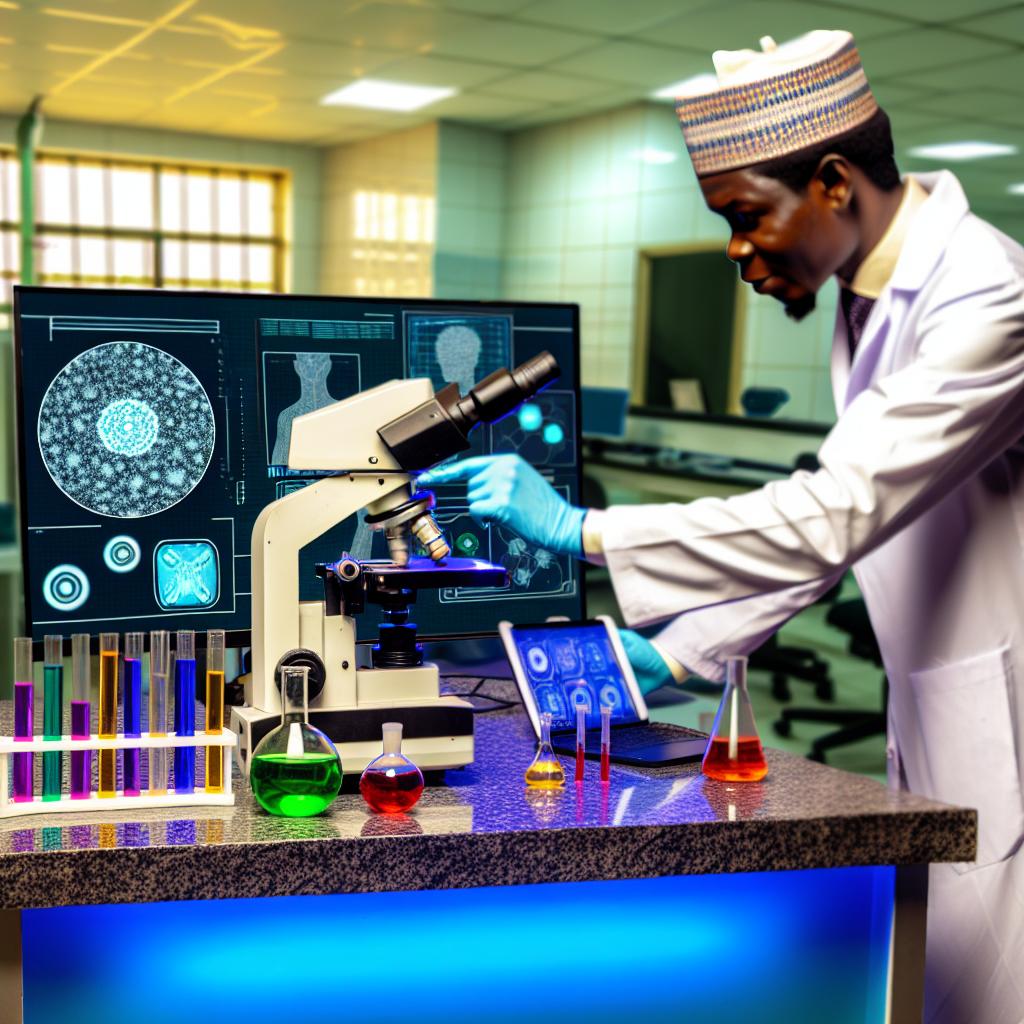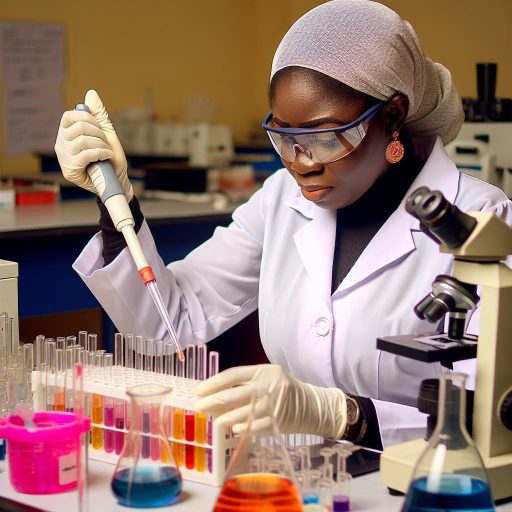Introduction:
Medical lab science equipment and technologies play a crucial role in the accurate diagnosis and treatment of medical conditions.
It includes a wide range of instruments and devices used to analyze samples and provide healthcare professionals with valuable information.
Importance of having up-to-date equipment in medical labs:
- Accuracy: Modern equipment ensures precise and reliable results, leading to better patient care and outcomes.
- Efficiency: Up-to-date technologies streamline lab processes, saving time and improving overall productivity.
- Quality Control: Advanced equipment helps maintain high standards of quality control, ensuring the integrity of results.
- Cost-Effectiveness: While initial investments may be high, modern equipment can reduce operational costs in the long run by improving efficiency and accuracy.
- Compliance: Keeping up with technological advancements in the medical field is essential for meeting regulatory requirements and industry standards.
- Innovation: Access to cutting-edge technologies enables medical labs to stay ahead in research and development, leading to advancements in healthcare practices.
- Patient Care: Ultimately, having up-to-date equipment in medical labs translates to better patient care, as healthcare professionals can make informed decisions based on accurate and timely results.
Overall, the importance of investing in and maintaining modern medical lab science equipment and technologies cannot be overstated, as it directly impacts the quality of healthcare provided to patients.
Overview of Medical Lab Science Equipment:
Definition of medical lab science equipment: Medical lab science equipment refers to the various tools, instruments, and apparatus used in laboratories to perform diagnostic tests and experiments.
Different types of equipment used in medical labs: Medical labs use a wide range of equipment, including but not limited to microscopes, centrifuges, analyzers, and more.
Importance of each type of equipment in conducting lab tests:
- Microscopes: Microscopes are essential for magnifying and examining cells and tissues for diagnosis.
- Centrifuges: Centrifuges are used to separate components of blood and other fluids for analysis.
- Analyzers: Analyzers are crucial for identifying and measuring various substances in patient samples.
Each type of equipment plays a vital role in the accurate and timely diagnosis of patients, helping healthcare professionals make informed decisions about their treatment.
Role of Technologies in Medical Lab Science:
Advancements in technology that have improved medical lab science:
- Introduction of automated devices for faster and accurate results.
- Utilization of advanced imaging techniques such as MRI and CT scans.
- Development of high-tech diagnostic tools for precise diagnosis.
Use of automation and robotics in medical labs:
- Automation reduces human error and increases efficiency.
- Robotic systems are capable of performing repetitive tasks with precision.
- Integration of automation and robotics improves workflow in laboratories.
Benefits of integrating technology in lab processes:
- Enhanced accuracy in test results leading to better patient care.
- Increased speed of analysis for quicker diagnosis and treatment.
- Streamlined workflow and reduced turnaround time for test reports.
See Related Content: Digital Health Innovations in Nigeria’s Public Health
Common Equipment Used in Medical Labs:
Medical laboratories are equipped with various tools and technologies that aid in the analysis and diagnosis of various medical conditions.
Here are some of the most commonly used equipment in medical labs:
- Microscopes: Microscopes are essential tools in medical laboratories for analyzing blood cells, bacteria, and other microscopic organisms. They play a crucial role in identifying abnormalities in blood samples and diagnosing diseases.
- Centrifuges: Centrifuges are used for separating the different components of blood, such as red blood cells, white blood cells, and plasma. This process helps in analyzing the composition of blood and diagnosing conditions like anemia or infections.
- Analyzers: Analyzers are sophisticated instruments used for testing and analyzing urine samples. They can detect abnormalities in urine composition, such as the presence of blood, bacteria, or excess proteins, which can indicate various kidney or urinary tract disorders.
Importance of these Equipment in Diagnostic Procedures:
The use of advanced medical lab equipment is crucial for accurate diagnosis and treatment of patients.
Here’s why these equipment are essential in diagnostic procedures:
- Microscopes: Microscopes enable medical professionals to visualize and examine blood cells, which is critical for identifying infections, anemia, and various blood disorders. They help in determining the appropriate treatment for patients based on the findings.
- Centrifuges: Centrifuges are indispensable for separating blood components, which is essential for conducting various diagnostic tests. By isolating specific components of blood, medical professionals can assess the patient’s overall health status and detect abnormalities that require medical attention.
- Analyzers: Urine analyzers provide valuable insights into the patient’s kidney function, hydration status, and potential metabolic disorders. By analyzing urine samples, medical professionals can diagnose conditions like urinary tract infections, kidney stones, or diabetes, and prescribe appropriate treatments to patients.
The use of common medical lab equipment such as microscopes, centrifuges, and analyzers is paramount in ensuring accurate and timely diagnosis of various medical conditions.
These sophisticated tools play a critical role in improving patient outcomes and enhancing the quality of healthcare delivery.
See Related Content: Radiography Ethics and Best Practices in Nigeria
Emerging Technologies in Medical Lab Science
Medical laboratories play a crucial role in diagnosing and treating diseases.
With advancements in technology, new tools and equipment are constantly being developed to enhance the capabilities of medical lab scientists.
In this section, we will explore some of the emerging technologies in medical lab science and their impact on diagnosis and treatment.
Overview of New Technologies
- PCR Machines for Genetic Testing
- Mass Spectrometers for Identifying Biomarkers
- Next-Generation Sequencing for Genomic Analysis
PCR (Polymerase Chain Reaction) machines are used in medical labs to amplify DNA samples for genetic testing.
This technology allows scientists to detect genetic mutations and identify genetic disorders with high precision.
Mass spectrometers are powerful tools that analyze molecules based on their mass and charge.
In medical labs, mass spectrometry is used to identify biomarkers that indicate the presence of certain diseases or conditions.
Next-generation sequencing (NGS) technologies have revolutionized genomic analysis in medical labs.
NGS allows scientists to sequence DNA and RNA at a faster rate and lower cost, leading to more comprehensive genetic testing and personalized medicine.
Impact of These Technologies
The integration of these emerging technologies in medical lab science has had a profound impact on the diagnosis and treatment of various diseases.
Here are some key ways in which these technologies are transforming healthcare:
- Improved Accuracy and Precision
- Personalized Medicine
- Early Detection of Diseases
- Research and Development
PCR machines, mass spectrometers, and NGS technologies provide highly accurate and precise results.
This enables medical professionals to diagnose diseases early and recommend targeted treatments.
By analyzing the genetic makeup of individual patients using PCR and NGS technologies, medical lab scientists can tailor treatment plans to the specific needs of each patient.
This approach, known as personalized medicine, has been shown to improve patient outcomes and reduce side effects.
Mass spectrometers are capable of detecting biomarkers that are indicative of certain diseases at an early stage.
Early detection allows for timely intervention and treatment, leading to better prognosis for patients.
These advanced technologies have also accelerated research in the field of medical science.
Scientists can now analyze vast amounts of genomic data quickly and efficiently, leading to new discoveries and advancements in treatment options.
The emergence of new technologies in medical lab science has revolutionized the way diseases are diagnosed and treated.
By leveraging PCR machines, mass spectrometers, and next-generation sequencing technologies, medical professionals can provide more accurate, personalized, and efficient care to patients.
As technology continues to advance, we can expect further innovations that will continue to improve healthcare outcomes and enhance our understanding of complex diseases.
Find Out More: Oral Biology in Nigerian Dentistry Curriculum

Maintenance and Calibration of Equipment
Proper maintenance and calibration of medical lab equipment are essential for ensuring accurate and reliable results.
Transform Your Career with Expert Guidance
Get personalized mentorship consulting that’s tailored to your unique path. Our expert advice is actionable and exclusive.
Get StartedIn this section, we will discuss the importance of regular maintenance, procedures for calibrating equipment, and the role of lab technicians in handling and upkeep of equipment.
Importance of Regular Maintenance for Medical Lab Equipment
Regular maintenance of medical lab equipment is crucial for maintaining the accuracy and reliability of test results.
Without proper maintenance, equipment may malfunction, leading to incorrect results that can have serious implications for patient care.
By conducting regular maintenance checks, lab technicians can identify any issues with the equipment early on and address them promptly.
This helps prevent downtime and ensures that the equipment is functioning optimally at all times.
Additionally, regular maintenance can extend the lifespan of medical lab equipment, saving the laboratory money in the long run.
It also helps prevent costly repairs or replacements that may be necessary if the equipment is not properly maintained.
Procedures for Calibrating Equipment to Ensure Accuracy of Results
Calibration is the process of adjusting equipment to ensure that it provides accurate and reliable results.
Proper calibration is essential for maintaining the quality of test results and ensuring the safety of patients.
Lab technicians must follow specific procedures when calibrating equipment to ensure accuracy.
This includes using standard reference materials and following manufacturer guidelines for calibration procedures.
Calibration should be performed regularly as per the manufacturer’s recommendations to ensure that the equipment remains accurate.
It is also important to document calibration procedures and results to demonstrate compliance with regulatory requirements.
Role of Lab Technicians in Proper Handling and Upkeep of Equipment
Lab technicians play a crucial role in the proper handling and upkeep of medical lab equipment.
They are responsible for conducting regular maintenance checks, performing calibration procedures, and ensuring that the equipment is functioning correctly.
Lab technicians should be trained on the proper handling and maintenance of equipment to prevent damage or misuse.
They should also follow standard operating procedures and safety protocols when using the equipment to ensure the accuracy and reliability of test results.
Additionally, lab technicians should promptly report any issues or malfunctions with the equipment to the appropriate personnel for repair or replacement.
By taking proactive measures to ensure the proper upkeep of equipment, lab technicians can contribute to the overall quality and efficiency of the laboratory.
Delve into the Subject: Radiography Equipment: What Nigerian Students Should Know
Budget Constraints in Acquiring New Equipment
One of the major challenges faced by medical labs is the high cost of acquiring new equipment.
The latest technologies often come with a hefty price tag, making it difficult for labs with limited budgets to stay updated.
Lab administrators and managers must carefully prioritize their spending to ensure they are able to acquire the most essential equipment for their lab while staying within budget constraints.
Need for Skilled Personnel to Operate Advanced Technologies
Another challenge is the need for highly skilled personnel to operate and maintain advanced technologies.
Many of the latest medical lab equipment require specialized training and expertise to operate effectively.
Labs may struggle to find or afford personnel with the necessary skills, leading to operational inefficiencies and potential errors in test results.
Investing in training programs for existing staff can help address this challenge.
Issues with Compatibility and Integration of Different Equipment in the Lab
Compatibility and integration issues can arise when labs have a mix of older and newer equipment that may not communicate effectively with each other.
This can result in data discrepancies and workflow disruptions.
Labs must ensure that their equipment is properly integrated and compatible with each other to avoid errors in test results and to streamline workflows.
Regular maintenance and updates can help address compatibility issues.
While medical lab science equipment and technologies have greatly improved the efficiency and accuracy of diagnostic testing, labs must also address the challenges and limitations that come with their use to ensure the quality of patient care.
Importance of Medical Lab Science Equipment
Medical lab science equipment and technologies play a crucial role in the accurate diagnosis and treatment of various diseases.
Investing in cutting-edge equipment is essential for ensuring accurate results and improving healthcare outcomes.
Healthcare facilities must prioritize the acquisition of state-of-the-art tools to support medical professionals in delivering quality patient care.
By embracing advanced technologies, medical laboratories can enhance efficiency, reduce turnaround times, and ultimately save lives.
It is imperative for stakeholders in the healthcare industry to recognize the significance of investing in modern medical lab science equipment.
Let us collectively commit to providing healthcare professionals with the resources they need to deliver the best possible care to patients.
Together, we can empower medical professionals with the tools they need to make informed decisions and improve patient outcomes.
Join us in advocating for the advancement of medical lab science equipment and technologies to create a healthier future for all.
Additional Resources
Department of Rehabilitation Science and Technology | Pitt SHRS




